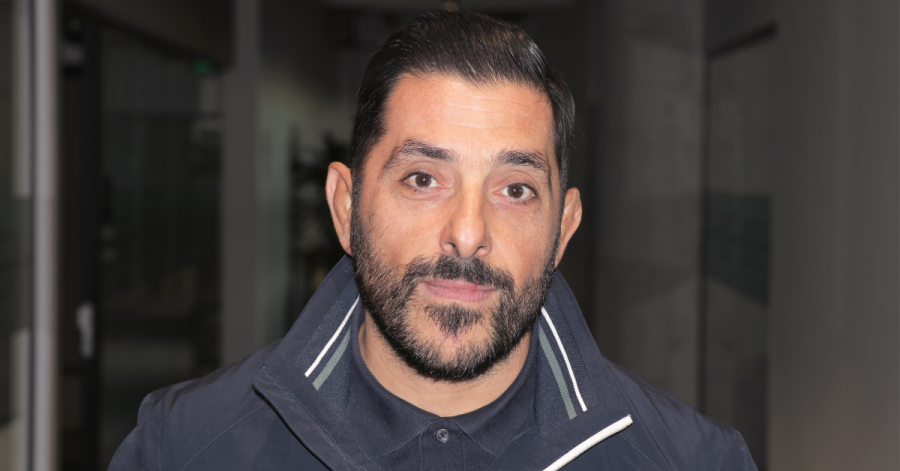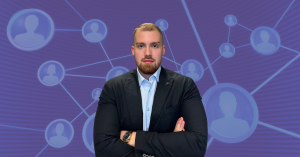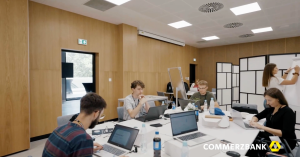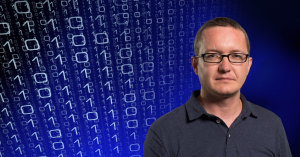There are thousands of articles online about what’s the role of a project manager in the tech field. But we wanted to experience first-hand what are the responsibilities of the role and the intricacies of managing different stakeholders. To learn these and many more insights, we sat down with Ovanes Kasabyan, Chief Project Officer at Scalefocus, the company that was recognized as PMO of the Year by PMI Bulgaria and a professional with nearly 2 decades in managing projects of all kinds.
Can you share what project management is for you? What are the principles of building and delivering a great project?
As Project Managers we are faced with something new and interesting almost every time we embark on a new endeavor. My strong belief is that this new experience only helps us improve the way we approach and manage our projects down the line. The problems we hit along the way, or the details we miss or fail to account for in our plans, become the lessons that help us excel in our line of business.
I like this quote I read somewhere “The work I do as a Project Manager is like creating a plan to build a Lego set in stages with different groups of kids building the separate parts…”. Well, who wouldn’t like to be part of it, right? Our job is to create that feeling in everyone on the team to ensure good results at the end of the project.
To have a great project (if such one exists at all😊) you should have a solid project management plan, which is understood and agreed upon by everyone. There are a few things that require attention for this to happen (not only of course):
-
- Take some time to listen and observe. Find who is who and what impact they are capable of. Sometimes even if you have a great team, it takes only one very vocal person who’s not on the same frequency as everyone to spoil it all for you.
- Ask questions. Don’t ever be afraid that you’ll be looked down on if something is not clear to you. On the contrary – you may even win peoples’ respect by your willingness to dive deep into the details, instead of just waving the baton and handing out tasks left and right.
- Make it clear to everyone, and more specifically, have the stakeholders’ commitment to what the project organization structure will be.
- Before taking on the project journey with your team (at the start of the planning phase), make sure to clearly specify to everyone the project’s goals. In other words – what would the expected benefits of its realization be, and what steps you should all take to get there? Sometimes it may not be so easy to see the end of the road from the very beginning. Be transparent with your team and ask for their help. That way you’ll ensure their engagement and complexity awareness from the very beginning.
- One vital thing predefines pretty much how things will go on during the project’s lifecycle – COMMUNICATION. Make sure that everyone on the project speaks with one voice and has the same understanding of things. Creating a formal communication plan is vital. Otherwise, you may end up with chaos at hand.
- Control the risks, be prepared, and try to not be caught by surprise as much as possible. Of course, risk is part of every project, and it is the PM’s job to have an eye on it throughout the entire project lifecycle. Have a plan in place for not letting possible risks become an issue. Raise that awareness in your team as well, as they can be very helpful by using their expertise to spot and raise early alerts.
- Have a plan to handle change. Very often change is the only constant in software development projects. This of course has strong implications on the projects’ constraints and if not controlled properly can lead to a quite unpleasant slippage of scope, time, or cost. To have that under control you should have a clear change management plan in place, which should be understood and agreed upon by all stakeholders.
- Manage expectations. Always make sure that stakeholders’ requirements are reasonable, well understood and can be actually delivered by your team. Don’t commit to unrealistic expectations just to please your sponsors – down the line you may end up making everyone unhappy. Have reasonable quality management and always try to deliver as if you are doing it for yourself.
- Last but not least, try to make everyone on your team believe in what they are doing. Make them interested, enthusiastic, committed and eager to see the best result in the end.
SoundVision is one of the projects that Scalefocus is most proud of. It granted them several awards, among which the Grand Stevie and PMI’s Innovative Project of the Year. Can you tell us more about it? What was the big challenge on the project management side?
To understand why SoundVision is so highly regarded, I should start by telling you a bit more about it. We are immensely proud of this project and everything that it entails as an idea, purpose, commitment, impact and recognition.
SoundVision is a groundbreaking electronic device designed to enhance the independence and mobility of visually impaired individuals. Unlike other assisting devices, it’s a compact, single-device solution connected to a mobile app, providing real-time information to facilitate users’ mobility and orientation through a built-in speaker or headphones. It not only showcases Scalefocus’s ability to deliver innovative solutions that positively impact society, but it also represents our team spirit, joint focus and collaboration. We have accomplished something that doesn’t leave a single person in the company indifferent to such a tremendous achievement.
Now looking at the Project management side of things. The project was very complex and required a specific implementation approach that combined adequately the flexibility of the relevant software development methodologies on the one hand, and the control mechanisms of traditional predictive project management frameworks on the other. This necessitated the application of a sustainable mix of flexibility and stability, to which good preparation and attitude from everyone involved contributed a lot.
Time and budget constraints made us apply the waterfall rolling-wave planning technique, and before each sprint disseminate the tasks and activities to the greatest possible detail. It was challenging to forecast expected costs as the features, teams, and technological aspects kept changing to accommodate all delivery challenges.
Considering the project’s innovative character, the team applied the fail-fast mentality where small increments and extensive testing were applied to determine whether our ideas and approach were feasible and would bring any value at all.
It sounds like a real challenge, especially to the PM-savvy people, but having everyone strongly believe in the purpose and the virtues of the end result brought additional structure and focus to the entire project. Frameworks and methodologies are essential to make one project happen, but people, their beliefs and emotions – make the impossible possible.
With initiatives like the PMO Academy, the EXPLORE soft skills program and the Buddies & Mentorship program, Scalefocus aims to support knowledge sharing among its team and build internal capacity in the field of project management. Can you tell us why you support young professionals to advance their skills?
Throughout my career, I’ve been in organizations where siloing was highly prevalent, and the sharing of knowledge and experience was rare or absent. This is definitely not the case at Scalefocus. When I first came here it made a very strong impression on me. Knowledge sharing and support are all over the entire organization.
So the answer is quite obvious. Who else, if not the young professional, should we support, mentor and develop? They may be lacking some experience at first, but they bring something really valuable to the table for our line of work – fresh perspectives and ideas. They are also more adept at embracing and utilizing new trends and knowledge.
By nurturing their skills, we can encourage a culture of innovation and creativity, leading to the development of new products, services, and solutions that can give us a competitive edge.
Working with them and enhancing their skills leads to improved performance. When we invest in the development of our young professionals, down the line we are likely to see an increase in productivity, efficiency, and quality of work. This contributes to the overall success and competitiveness of the company.
Last, but not least, we want to make them feel welcome and in the right place. This is only possible if one feels supported, so they gradually gain the confidence of knowledge and experience.
Looking at the big picture, what’s the impact of the PMO team on the whole Scalefocus organization?
Scalefocus has probably the best engineering talent around, but I would very much like to believe that also having the best PMO helps the company serve its mission of bringing together a world-class team, industry expertise and technology excellence, that empower businesses to grow and meet the challenges of tomorrow through tailored software solutions and services.
Our engineers definitely know how to develop the best code but bringing all the moving parts together into a well-aligned sequence of activities and structure, by continuously maintaining transparency and awareness amongst all stakeholders, managing risks, and expectations at all levels in the respective project, requires specific set of skill and experience, and here comes our role – the PMO.
We have expertise in all project management frameworks out there and by leveraging it we can consult our clients on the best project execution approach, which will address all project or individual stakeholders’ specific requirements and peculiarities. We have flexible service models that can basically address any PMO-related needs, which is something that very few can offer with such confidence.
What are Scalefocus’ plans for the future in the field of project management?
Our purpose has always been centered around our excellence. From the very beginning, we have set ourselves the goal of becoming a benchmark for professionalism and quality in the region, and I believe that the recognition we received at the 2023 PMI Bulgaria Awards this year as PMO of the Year is unequivocal proof that we had our eyes and minds in the right direction.
We certainly plan to defend this title with dignity. In addition to prestige and recognition, it carries a great degree of responsibility towards the PM community, the company itself, and its customers. We can’t let them down, can we?
We will certainly continue to develop our team in the latest trends and practices in the industry. Our focus is on further cultivating our power skills, as in our profession they will continue to be a decisive factor in the future. One thing to always remember is that Project management is all about dealing with people. Our belief has always been that excellent communication, leadership skills, and the ability to easily interact with people, make a whole lot of difference between successful projects and clogged situations regardless of the size of the project.
You have extensive experience in project management and operations. Can you share with us what’s the most important advice another professional gave in your career? What will be your advice to any young professional who is taking the first steps in their career as a PM?
As weird and trivial as it may sound the best piece of advice a wise lady once gave me was “Learn to listen”. I was taking the first steps in my career path, and it made a huge impact on my development both as a professional and an individual.
At first, it didn’t make much sense to me, even the opposite as I was eager to achieve results and make an impression. I wanted to prove myself, so I was quick to act, reasoned rather little and rarely listened to different opinions. What can I tell you, I was young and restless.
As I started gaining experience her words began to make sense and resonate with me. I began to hear and read every environment I was in, developing an instinctive self-awareness. Thanks to that I can adequately understand attitudes and microclimates on all levels and layers so that I can offer the necessary help and approach – whether for the realization of a project, formation and cohesion of a team or the pursuit of company goals.
Therefore, my advice to anyone whose work heavily involves interactions with people is to learn to listen, not get stuck over what impression you’ll make, and you’ll realize, although perhaps unconsciously, that once you start listening properly, everything will fall into place with time.







